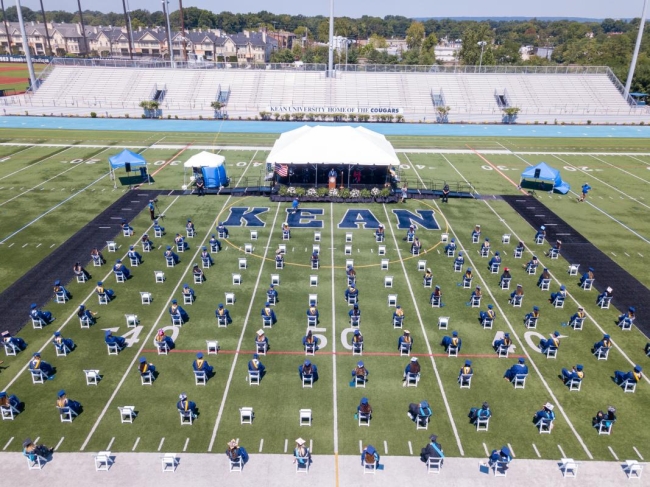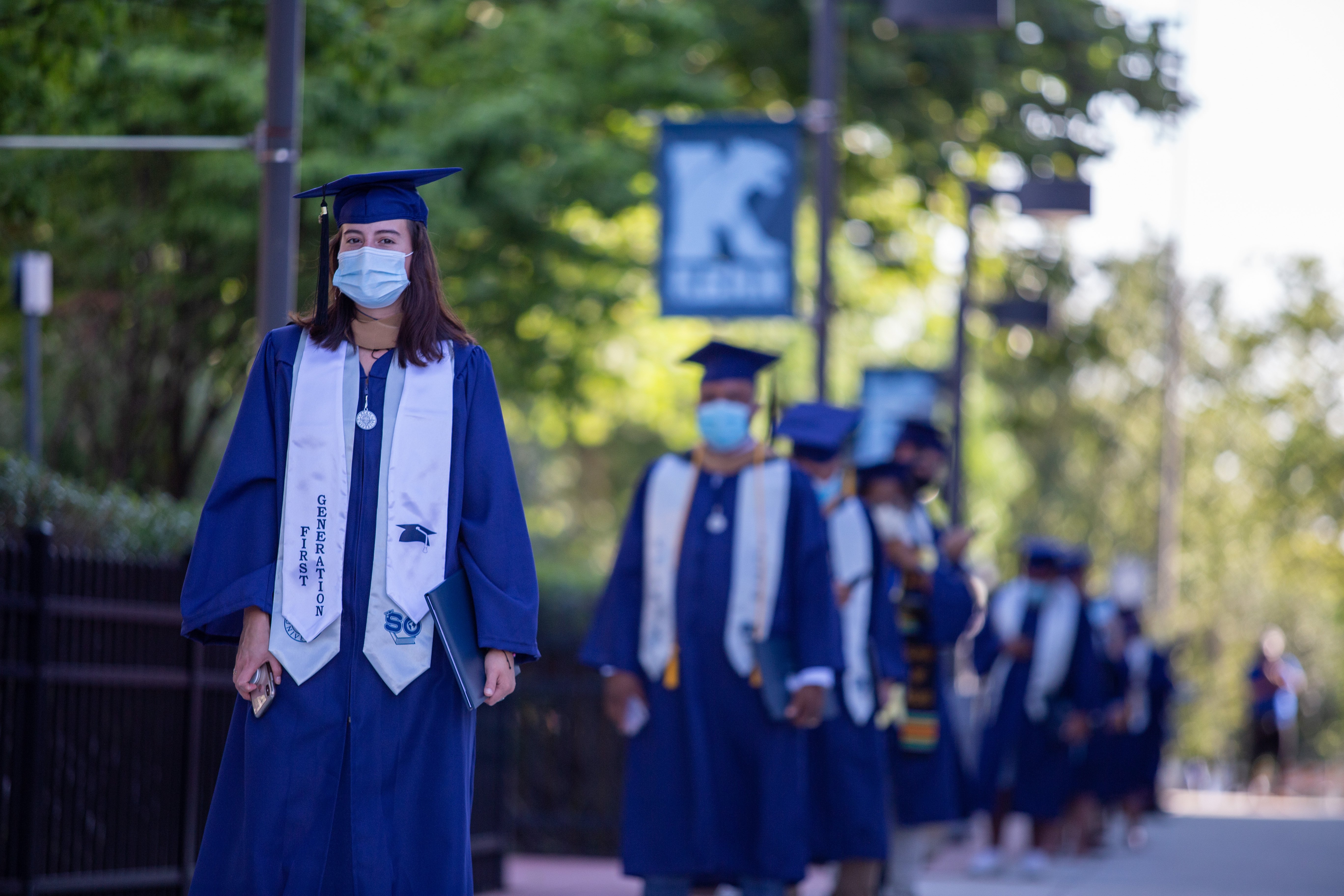You have /5 articles left.
Sign up for a free account or log in.

Kean University held in-person commencement ceremonies last year.
Kean University
When Lamont Repollet, president of Kean University, considered how to pull off an in-person graduation ceremony during the coronavirus pandemic, he remembered walking across an auditorium stage during his own commencement nearly 27 years ago as a first-generation college student at the College of New Jersey and being engulfed by a feeling of accomplishment.
“It was the greatest moment in my life,” Repollet said. “If we can give that to our students, all students, but more so those individuals who had the perseverance and the grit to finish, that’s important.”
 With those students in mind -- half of whom are first-generation college students -- Kean, which is also located in New Jersey, announced it will move forward with its second year of socially distanced, sized-down graduation ceremonies on the university’s football field during the pandemic. Repollet will be elbow bumping and taking socially distanced selfies with students as they cross the graduation stage, balancing safety and tradition as students and their families gather for the milestone that can’t be replicated via livestream.
With those students in mind -- half of whom are first-generation college students -- Kean, which is also located in New Jersey, announced it will move forward with its second year of socially distanced, sized-down graduation ceremonies on the university’s football field during the pandemic. Repollet will be elbow bumping and taking socially distanced selfies with students as they cross the graduation stage, balancing safety and tradition as students and their families gather for the milestone that can’t be replicated via livestream.
"We were very cautious and we followed CDC guidelines," Repollet said of the 2020 commencement events. "We will continue to have smaller ceremonies. It doesn't matter how many we have to have … We're excited to be able to provide that for our students."
Kean students said they are also confident about the precautions the university is taking to make the events safe -- and possible. Roshorn Shivers, a senior who will graduate with a psychology degree in May, is looking forward to the ceremony. He is the first in his family to earn a bachelor's degree.
“We have faced so much within the last year that we’ve been remote,” he said. “Walking will give us some type of normalcy.”
The University of Oklahoma at Norman will welcome both 2020 and 2021 graduates to the university’s football stadium for six separate ceremonies this spring, after holding only virtual ceremonies in 2020, President Joseph Harroz announced Feb. 4. The same goes for the University of North Texas, where 2020 and 2021 graduates will be welcomed back to Denton, Tex., for ceremonies during the last weekend of April and early May.
Access to a large stadium to adequately distance students and their families during the ceremonies certainly helps make the in-person events more feasible, Repollet said.
Students at other colleges won't be as lucky. Those colleges started announcing last week that their spring commencements would be virtual for a second consecutive year. The so-far slow drip of virtual ceremony announcements is prompting a fresh wave of disappointment among students whose colleges determined it unwise to host graduation events as the pandemic continues and vaccinations have not yet been widely administered at college campuses.
Karen Nedbal, executive director of the Association for College Conference and Events Directors -- International, a membership organization for staff members who plan campus events such as commencement ceremonies, said 2020 offered a range of completely virtual to “slimmed-down” versions of in-person graduation events, and she expects to see a similar variety this year. Some colleges arranged for masked graduates to individually walk into a room where the college president or other administrators are present, take a picture with the officials and walk out, as a replacement for the real thing, Nedbal said.
While canceled in-person commencements have been disappointing, there has also been an upside -- at least for the colleges. The nontraditional ceremonies saved some institutions significant amounts of money on audio and visual resources, security, speaker fees, and renting chairs, tents and stages, Nedbal said. Some colleges saw cost savings in the “six- to seven-figure range,” which is much needed during a time of economic turmoil for many institutions, she said.
It’s hard to draw conclusions about what will happen this year as the pandemic rages on and state governors or public health agencies continue to set and revise gathering limits, Nedbal said. But what’s been consistent among college events administrators is their desire to create commencement ceremonies that provide students and their families with a sense of connection to the institutions, she said.
“It’s so important this year, after really feeling a lot of disconnect,” Nedbal said. “That’s top of mind.”
Important social aspects of students’ college life -- involvement in campus activities and feeling like a part of a “college community” -- were especially lacking during 2020, according to a student satisfaction survey published in November by Anthology, a higher ed technology services company. More than one-quarter of the 1,143 students surveyed said they felt disconnected from their colleges during the fall semester.
Additionally, some spring 2020 graduates, whose commencements were delayed or held virtually last year, were doubly disappointed after colleges such as Brown University in Rhode Island reneged on allowing 2020 graduates and their families to participate in an in-person ceremony for the Class of 2021 this year.
"Sadly, given the reality of the public health landscape, this will not be feasible,” Brown's president, Christina Paxson, said in a Jan. 21 letter to the campus. The university will hold an in-person commencement for the Class of 2021, but their families will have to tune in virtually.
“Positivity rates statewide and across our country remain high,” Paxson said. “There are concerning reports of a more transmissible variant of the virus, and widespread vaccine distribution is taking longer than we would like … I am so sorry to write with such disappointing news, especially when our community has already sacrificed so much.”
Under the latest guidance from the Centers for Disease Control and Prevention on social gatherings, Kean’s upcoming May ceremonies would be “higher risk” but permissible under New Jersey governor Phil Murphy’s current COVID-19 executive order, which allows for 500 attendees at outdoor gatherings and requires guests to wear masks and be seated at least six feet apart.
The state orders can of course change based on COVID-19 case surges or other developments, but Repollet is confident the college can have a repeat of last year’s successful in-person commencement ceremonies in late July.
Some of this year’s graduating seniors respect the reality of the pandemic and said they would not support their college leaders inviting families to an in-person ceremony. Corrine DiStefano, who will graduate from the University of the Arts in Philadelphia this spring, said she doesn’t blame the university “at all” for pushing 2021 commencement to a virtual format.
“Having an in-person event like that would’ve been ill advised,” she said in a social media message. “This is the best possible course of action and I would not have gone to an in person event if it was held because it would be dangerous.”
Autumn Pressley, a senior and president of the University of Georgia’s Student Alumni Council, said while it would be “nice to have a little piece of senior year back” with an in-person commencement ceremony, it needs to be safe. This semester she’s felt anxious about COVID-19 while going to in-person classes on the Athens campus. UGA hasn’t publicly announced whether its 2021 commencement ceremonies will take place in person or virtually.
“If it can’t happen, I’m happy that my parents don’t have to come here and possibly be exposed,” Pressley said.
Pressley expects she and other seniors will miss out on a “sentimental” tradition at UGA where graduates gather in the G on the field of Sanford Stadium, just like they did during Freshman Welcome as first-year students, which is a “full-circle moment” that encapsulates their time at the university. To try and raise seniors’ spirits, the student alumni group, which promotes university traditions and philanthropy, has been focused on “getting creative and keeping morale up with students, but in a way that’s safe and still positive,” Pressley said.
The group launched a 100-day challenge last week that will lead up to graduation and involves seniors submitting photos completing items on a “bucket list,” such as attending a football game during their time at UGA, as part of a contest to win a range of prizes.
Alongside its virtual graduation ceremonies in the spring and winter, Bowie State University in Maryland sent students a gift box with university-branded items and designed free graduation yard signs to be directly delivered to families who ordered them, said Nancy Martin, director of conference and event services. Graduates had the chance to upload photos or videos of themselves to a personal graduation slide show that was livestreamed during the ceremonies, and they could use a filter on Snapchat, a social media app, to put on virtually augmented regalia, Martin said.
“It speaks to the care and work ethic of the BSU faculty, staff and students,” Martin said, noting the collaboration of a university committee formed during the spring that quickly pulled off a “personalized experience” for the 2020 graduates.
“We could’ve just recorded something that would’ve been celebratory, but we wanted to go above and beyond and have those personal moments and touches,” she said. “While we couldn’t be together, we’re still going to make [students] feel special for [their] achievement.”
Nedbal, of the college events directors association, said she expects some features of the pandemic commencement ceremonies to stick around, even after colleges return to in-person traditions. The livestreams and online videos allowed students’ family members from around the world to be part of the celebration, she said.
Virtual ceremonies were also more inclusive; some colleges, such as the University of Colorado, Denver, incorporated Spanish-language subtitles in their commencement video, and Nedbal said others expanded their use of American Sign Language and English subtitles for people who are Deaf or hard of hearing. Kelly Mason, assistant director of events at CU Denver, said in an email that having the graduation video accessible online at any time makes it easier for adult students or those located in different time zones to “have the same experience at a time that works best for them and their families.”
Nedbal said these innovations are “increasing the diversity, equity and inclusion factor of commencement in a way that’s never been done before.”
While some of these new and positive pandemic commencement traditions are here to stay, most colleges will likely go back to in-person celebrations as soon as they can, Nedbal said.
“The more traditional ceremony will still at the end of the day prevail, once we get this pandemic behind us,” she said.




